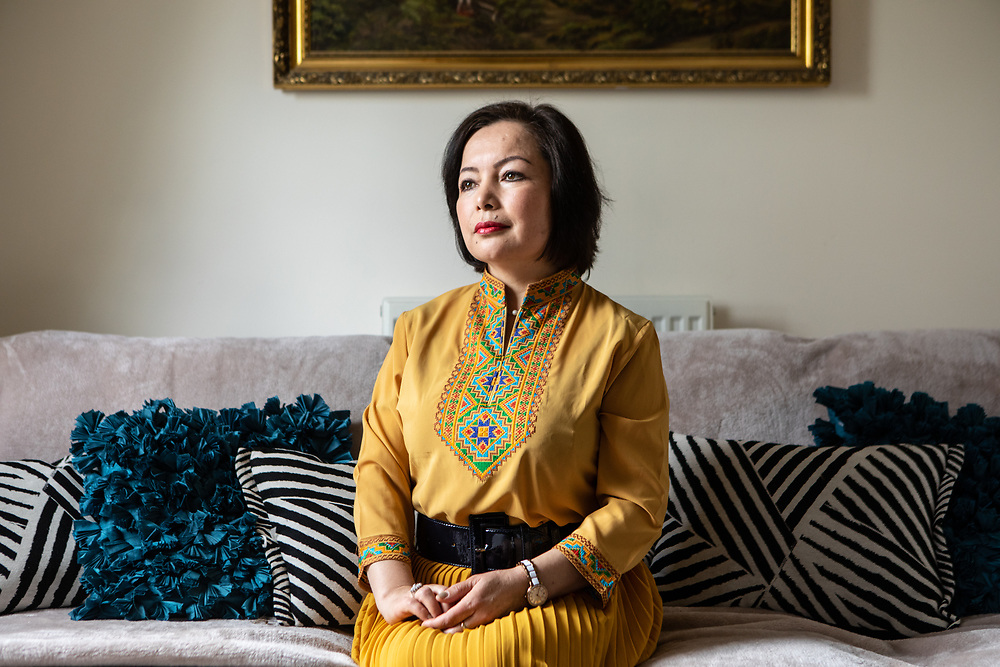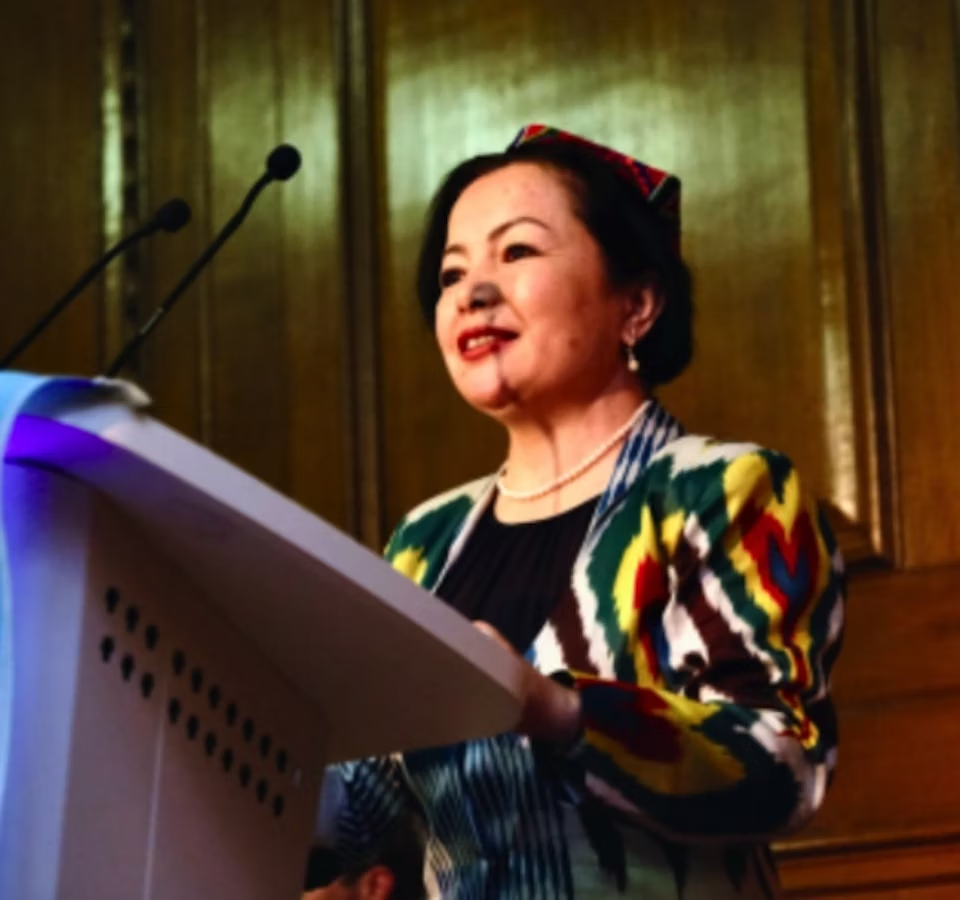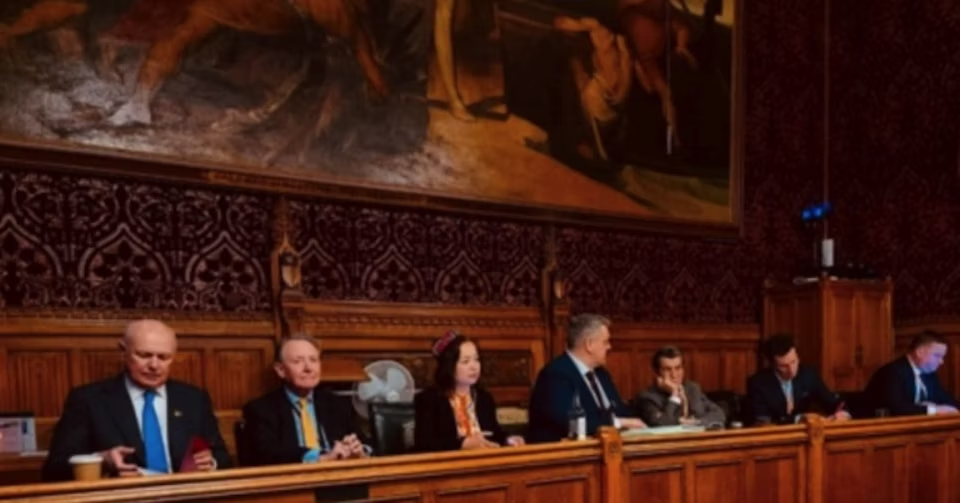Rahima Mahmut
Singer
China

In the soft glow of the stage lights, six musicians begin to play. A variety of string instruments—including dutar, violin, bağlama, and ghijek—build a kaleidoscopic harmony, and at the center of the ensemble, a woman in a colorful dress closes her eyes and starts to sing. Her voice trills, filling the spacious hall with emotion. This is Rahima Mahmut performing with other members of the Miras Silk Road Collective at Grand Junction.
Mahmut is a London-based singer and activist who has dedicated her life to spreading awareness of the Chinese government’s oppression of Uyghurs: people native to the so-called Xinjiang Uyghur Autonomous Region in China (or, by the name that Mahmut prefers, East Turkestan). Through decades of persistent advocacy and an unbreakable bond to Uyghur folk music, Mahmut has risen to global acclaim as a celebrated musical artist, award-winning translator, founder of Stop Uyghur Genocide, and the former UK Director of the World Uyghur Congress.
From Homeland to the UK
Mahmut lived most of her childhood in a village in Ghulja—a northern oasis in the Uyghur homeland—where she was embedded in a rich musical culture. On her mother’s side, she came from generations of musicians who would take any occasion to sing and dance to folk songs and Muqam, classical Uyghur melodies. “After a cup of tea,” she recalls, “the music would start.” In the mornings, Mahmut would hear men and women in the village singing, tools in hand, on their way to the fields, which gave way to wide vistas of lakes and snow-capped mountains. “Even now,” she says, “when I close my eyes and sing some of the songs about the orchards, the gardens and flowers, and the beauty of the nature, it carries me back to the heart of that culture.”
Mahmut was as surrounded by Uyghur music as she was by the political forces that tried to stifle it. In one vivid, childhood memory, she was at home singing the title of a radio station—“Free Homeland Radio Station”—that her father often listened to. Her father looked at her in horror and told her never to repeat the title. “‘If you say that again,’” she recalls him saying, “‘the police will come and take me.’” Mahmut would later understand that the radio station was Soviet-run and opposed the occupation of the Uyghur homeland. This incident was Mahmut’s introduction to the effects of China’s Cultural Revolution—a political movement of the 1960s and ‘70s that aimed to strip citizens of their traditional ways. Everyday, she overheard whispered conversations between her parents of neighbors and community members being imprisoned and taken to labor camps. When the villagers were returned in the late-70s and early-80s, they were welcomed back with song.
Mahmut had always dreamed of performing. Her father enjoyed music, but he did not want his children to take it up as a profession. “For him, it was okay to have it as something that helps you emotionally, fills your soul, and makes you feel special,” she explains, “but for making a living, you should be a scientist or something else.” In the late-1980s, during the “golden era” following the Cultural Revolution, Mahmut followed her father’s wishes and traveled 5,000 kilometers—a one week journey—from her home to eastern China to study Petrochemical Engineering at the Dalian University of Technology, one of the top science universities in the nation. At Dalian, about fifty to sixty Uyghur students numbered the more than 10,000 student body.
Among the Han Chinese—the ethnic majority in China—the Uyghur students were known as people who loved to sing and dance. “We had a reputation,” she says. When she discovered the university’s beautiful concert hall, she decided to fulfill that reputation. At a university-held concert, she took to the stage for the first time and performed an Uyghur song in front of a large audience. She had planned to sing only one song but was met with such applause that she ended up singing three. “That really boosted my confidence.” After that, everywhere she went—from small gatherings to large parties—friends would bring out their guitars and beg her to sing.
Democratic ideas grew in popularity through the 1980s among students, eventually leading to the student movement of 1989. Rahima was among the 2,000 students from Dalian who participated in peaceful protests in Beijing, though she departed on June 2nd after hearing repeated, ominous warnings from the authorities. Two days after she left, the government deployed the military and killed an undisclosed number of civilians, including protestors, organizers, and bystanders. The incident, commonly known as the Tiananmen Square, or June 4th, Massacre, deeply impacted Mahmut. “The way that they branded the peaceful protesters, the students who demanded their basic rights…and then crushed that movement. That shaped my view of what the government is like and what they’re capable of doing to people of different opinions who dare to challenge the system.” Every year since coming to the UK, Mahmut has attended an annual vigil organized by activists and survivors of the atrocity.
After graduating, Mahmut returned to East Turkestan and worked for four years as a chemical engineer before becoming a teacher at a technical college in Maytagh in the Karamay region. Between classes, she would give her Uyghur students advice for how they could “equip themselves with knowledge” and obtain jobs in an environment that grew increasingly discriminatory against them. “Censorship was everywhere,” she says. “We had to self-censor all the time to avoid being caught.”
In 1997, while visiting her mother on winter vacation, she witnessed the Ghulja Massacre in which police incarcerated Uyghur protesters en masse. The police went door-to-door searching for demonstrators and arresting them. Family members and neighbors suspected of taking part in the protests were imprisoned without evidence. One neighbor, she says, was executed.
In the following years, the Uyghur plight escalated as Chinese authorities imprisoned more Uyghurs, stifled speech, discriminated against them in the job market, and prevented them from practicing their religion. “I knew by 1999 I was under their radar. We could see a lot of news about some artists, writers, and teachers disappearing.” If she left the country, she would be leaving behind her family, but if she stayed, she would have to live a life of extreme self-censorship with no assurance of safety. She ultimately decided to leave, obtaining a visa and traveling to the United Kingdom to earn a Master’s degree. “I always thought, if things got better, then I would go back and continue to teach and live there. But things actually got worse. Every year things became worse. For Uyghurs, life became absolutely difficult.”
“Oh Wind, Cry”: A Fighting Spirit
Living in exile for two and a half decades, Mahmut has used music as a means of spiritually returning home, preserving her culture, and keeping the genocidal and cultural erasure of Uyghurs in the public eye. In 2013, when a diagnosis of grade three breast cancer isolated her from others, she took comfort in reading poems by the renowned Abdurehim Ötkür, who was imprisoned several times throughout his life for his writing. In the debilitating fog of chemotherapy, Mahmut came across one of Ötkür’s poems, “O Youth,” which deeply resonated with her. It reads:

Rahima Mahmut speaking at "Stop Uyghur Genocide" conference.
My youth is not like flowers that bloom again after they fall,
Nor like a crane that returns in spring after leaving in the fall.
Like a bird, it flew away, leaving me in sorrow and regret.
No matter how many times I complain, it will not return from its journey.
Oh cup-bearer, grant me respite from worry for a moment,
Before the cold hand of death claims this weary body.
Mahmut found comfort in Ötkür’s words. “Youth is not going to be there forever,” she explains. “No matter how sorrowful I am, it’s not going to change anything.” She realized that she was still young and had “so much to give.” Emboldened, Mahmut recorded herself singing the verses on her phone. She would later work with a musician to turn the recording into a song. Ötkür’s would not be the only words that Mahmut would express through song. In 2019, when the celebrated Uyghur poet and editor Chimengül Awut was detained by Chinese authorities, Mahmut was struck by the poignancy of one of Awut’s poems. The poem, which Mahmut translates to, “Oh Windy, Cry,” gave voice to her anguish. “I felt I needed to sing this to express my feelings, as well as her pain.” (Munawar Abdulla’s translation of Awut’s poem can be found here.) In 2020, Mahmut was contacted by journalists from Al Jazeera to produce “O Youth” and “Oh Wind, Cry” for Living in the Unknown, a documentary about three young women living in Istanbul. “Being in the West,” she says, “I can freely sing the original lyrics. I can freely compose songs from imprisoned writers.”
In 2021, Mahmut participated in Requiem for Justice—an annual rally of artists and activists—where she sang a poem by Muhemmet Abdumijit, an Uyghur poet-in-exile. Titled, “My Dear Son, When Will You Return,” the poem imagines the fears and sorrows of Abdumijit’s mother longing for her missing child.

from Instagram, @uyghurcongress
As the situation worsened in her homeland—the heightened surveillance of Xinjiang, the construction of reeducation camps the size of cities, the unwarranted arrests and disappearances of Uyghur artists and activists—Mahmut persisted with her advocacy, raising awareness through her musical affiliations, translating Uyghur literature, holding demonstrations, speaking to journalists, and building coalitions of UK-based activism organizations.
In 2004, she co-founded the London Uyghur Ensemble, which eventually expanded its repertoire to include Turkish, Azerbaijani, Iranian, and Arabic music, becoming the Miras Silk Road Collective. The group is dedicated to preserving literature, music, and culture of Uyghurs and has performed in the United States and across the Eurasian continent. In addition to her musical advocacy, Mahmut is also an award-winning translator whose work has significantly supported the Uyghur cause. In June 2017, her translation of Söyüngül Chanisheff’s memoir, The Land Drenched in Tears, won the prestigious English PEN Translation Award. Mahmut has also played a pivotal role in translating survivor testimonies for the Uyghur Tribunal.
Over the years, journalists have called on Mahmut to give her expertise on the Uyghur plight. She has appeared on talk shows and podcasts such as The Rest is Politics and Middle East Eye, among many others. As a consultant and translator, she has contributed to several high-profile documentary productions, including ITV’s Bafta-winning Undercover: Inside China’s Digital Gulag, BBC’s China: A New World Order, and Channel 4’s China: The Search for the Missing. She has published several of her own editorials in major UK news outlets, including The Spectator, The Guardian, and The Independent.
In the last five years, Mahmut founded the campaign Stop Uyghur Genocide and served as the former UK Director for the World Uyghur Congress. These impactful projects have cemented her role as a leading voice for Uyghur human rights and cultural preservation.
Muqam: Preserving Music, Preserving A People

Rahima performing at St. Bartholomew the Great, 2021
Like the landscape of Mahmut’s homeland, Muqam is intertwined with centuries of a rich cultural history. Most Muqam lyrics originate from the Sufi tradition, written by renowned Sufi poets such as Nava’i. Many songs include the word Allah, reflecting a spiritual connection to the divine. In the Uyghur homeland, the word must now be changed when the songs are sung, “completely erasing the very essence of that beautiful culture,” Mahmut explains. Mahmut’s singing and activism exemplify the immense power that art and advocacy have to preserve beauty and faith when they are used together. “Yes, the Chinese government is very powerful,” Mahmut says, “but one person can do a lot. You can make a huge difference.”
Aleah Gatto, January 2025. Aleah is an early-career journalist with a focus on human and environmental rights. Currently the Membership Engagement Manager at PEN America, Aleah lives in the Bronx.





